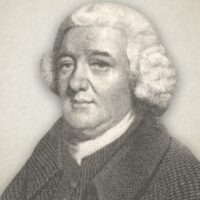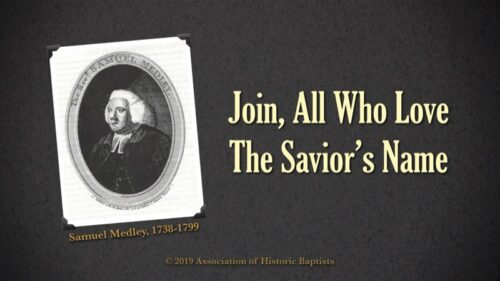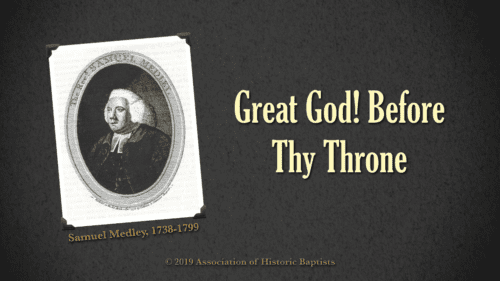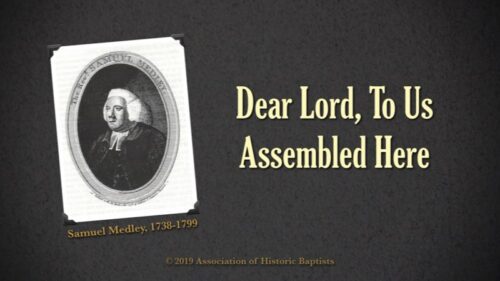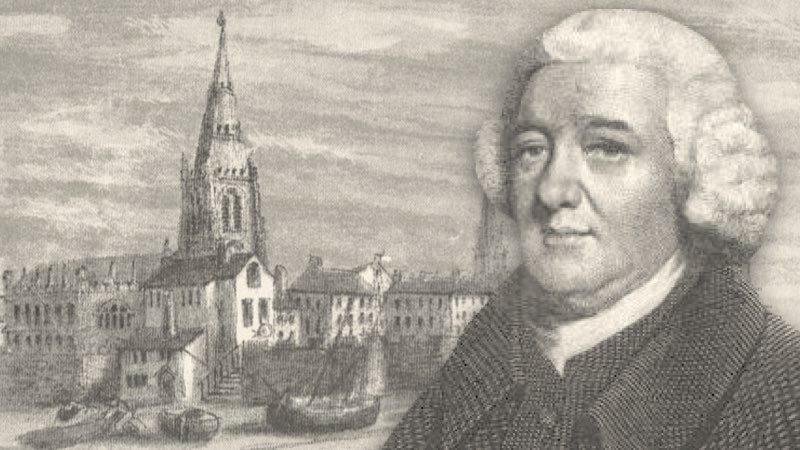
The Life And Testimony Of Samuel Medley
William Rushton
Mr. Samuel Medley was for twenty-seven years the pastor of a Baptist church in Liverpool, but as he frequently preached in the metropolis, he was well know there, and in many parts of the country, where his labors were extensively useful. His views of divine truth were nearly the same as those of Dr. Gill; and although he was far removed from a party or bigoted spirit, he was too faithful to escape the revilings of many, who were willing to bury the doctrines of the gospel under the pretence of universal charity. In the latter part of his time, the sentiments of Mr. Fuller were beginning to prevail, but had not then obtained an entrance into the church at Liverpool, a circumstance for which Mr. Medley, in conversation with a friend expressed his thankfulness to God. In a letter written with his own hand during his last illness, to my near and honoured relative, he thus declares the foundation of his hope. “I know no other name, I want no other foundation for my hope and salvation for time or for eternity, but that of Jesus, and everlasting love. This has never failed any of God’s chosen and called yet, and I am persuaded it never will. I do not love trimming and half-way preaching nor professing either. You can and will, my dear brother, I trust, bear me witness, that ever since you have known and loved me in the bonds of the gospel and in the bowels of Christ, that I have, as I trust by grace enabled, uniformly set my face against all such mingle mangle. I know, and daily feel I am a poor, dark, weak, and worthless worm; but I trust I would not walk willingly in craftiness, nor knowingly handle the word of God deceitfully, for all the world, or all the men in the world, whether professors or profane, whether they frown or smile. And these things I write not to aggrandize or set up myself, O no! God forbid, but to bear my sincere and humble testimony to the truth as it is in Jesus.”The following account of Mr. Medley’s dying testimony to the glorious truths of the gospel is extracted from the memoirs of him, published by his son. [London, 8vol. 1800.]:
“From the first of his illness he labored under great depression of spirits, arising partly from the nature of his disorder, but more especially from the frame of his mind, which was in general low and dark, mourning much on account of the loss of sensible comforts. During this trial he would sometimes say he ‘feared he had only been instrumental in the salvation of others as a scaffold to the building, which, when completed, is taken down as of no further use.’
“This dejected frame did not long continue, though the change that took place was gradual. He was somewhat cheered by the following passage: ‘Come unto me, all ye that labor and are heavy laden, and I will give you rest.’ ‘Blessed are they that hunger and thirst after righteousness,’ &c., &c.
As his bodily infirmities increased, the gloom and darkness under which he had labored where dispelled, and the delightful dawn of an eternal day began to break forth. His confidence and comfort in God, as his covenant god in Christ Jesus, constantly increased; and he became more and more resigned to the sovereign of his heavenly Father, casting himself on the Rock of ages, and patiently waiting the termination of his troubles. The 17th chapter of John was peculiarly precious to him. He often read it during his illness. ‘It is indeed the Lord’s prayer,’ he would say, ‘none but Christ could use that prayer.’
“In a letter which he wrote a few days before his death, he said, ‘Blessed be God, he supports and upholds my mind on and by his good word and the Holy Spirit. Though I have no ravishing frames, or flights of soul, yet I humbly trust the eternal God is my refuge, and underneath are his everlasting arms.’ He then repeated those words in the 130th Psalm, ‘I wait for the Lord, my soul doth wait, and in his word do I hope.’
“To a clergyman with whom he had lived some time in the habits of friendship, he said, ‘Farewell, God bless you: remember I die no Arminian, Arian, or Socinian. I die a poor sinner, saved by sovereign, rich and free mercy.’ To another, whose occupation had formerly been in the sea- faring line, he said, ‘I am now a poor shattered bark, just about to gain the blissful harbor; and O how sweet will be the port after the storm!’
“On the day before he died, he exclaimed, ‘Is there not an appointed time to man? Sweet Jesus, thou art my strength, my support, my salvation, my salvation. Tell my dear friends I am going: Jesus is with me, and I am not dejected. I am full of comfort and consolation, and able yet to recollect God’s precious word. I never saw so much of my own unworthiness, or so much of the excellency, glory, and suitableness of Christ as an all-sufficient Saviour. As to my sentiments,’ he continued, ‘I am no ways altered. The doctrines I have preached, I am fully persuaded, are of the truth. They are now the support and consolation of my mind. That Jesus, whom I have so long recommended to poor sinners, is my only comfort in my dying hours. His salvation is every way perfect and complete.’
“Early in the morning of the day on which he died, he said, with a serene and smiling countenance, ‘Look up, my soul, and rejoice, for thy redemption draweth nigh!’ He then added, ‘I am looking up to Jesus—but a point or two more, and I shall be at my heavenly Father’s house.’ Though his bodily agonies were sometimes extreme, yet the views he had of the finished salvation of Jesus raised him above them all, and in this happy frame of mind did he continue, till, with a smiling countenance, he yielded up his spirit into the hands of his heavenly Father, on July 27, 1799.”
Samuel Medley (1738-1799) was a Particular Baptist preacher and hymn writer. He was appointed the pastor of a church on Byrom Street, Liverpool, where he served for twenty-seven years.



